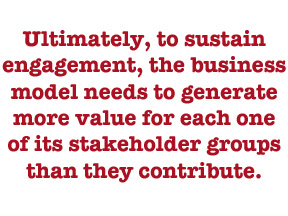By Rachel Happe, Principal/Co-Founder, The Community Roundtable
Engagement is a hot topic. For those of you who have heard me speak, you know I don’t think all engagement is created equally and I think there is far too little focus put on the purpose behind the engagement. You can have high engagement and very little value – look no further than the comments on a general news site. The other common problem is you have no engagement at all, which happens far too frequently inside organizations where people feel like the only outcome of sticking their head up is becoming a good target.
 Editor’s Note: This post was originally published by Rachel on LinkedIn. Follow her there, too!
Editor’s Note: This post was originally published by Rachel on LinkedIn. Follow her there, too!
What’s interesting is that in most cases we diagnose the issue as a tactical one – we aren’t providing good enough tools or spaces for people to engage in a constructive way.
The more sophisticated organizations realize that tools alone won’t solve the problem and have started investing in the operational systems that include community managers to ensure that when people engage they get real value from it. This is where I spend a lot of my time – helping companies understand how to build systems of engagement. But it’s not a complete solution either.
Ultimately, to sustain engagement, the business model needs to generate more value for each one of its stakeholder groups than they contribute. People need to feel like investing and contributing to the ecosystem will return disproportionate rewards to them. If it does, they will return to engage again and again and again.
The implications to business models are quite radical, however, and in a way most organizations cannot accept  given their current leadership. This type of business model requires the organizations themselves to recognize revenue and value only after it has ensured each stakeholder group has gotten more value than they have contributed. Typically, organizations work to recognize as much value as possible, as soon as possible; when’s the last time you heard a sales executive say ‘We don’t get paid until our customers feel like they have won’? This mentality leaves stakeholders feeling combative, not collaborative – whether they are customers or employees – and that does not lead to organic and frequent engagement because those stakeholders don’t see the organization’s success and their success as the same thing.
given their current leadership. This type of business model requires the organizations themselves to recognize revenue and value only after it has ensured each stakeholder group has gotten more value than they have contributed. Typically, organizations work to recognize as much value as possible, as soon as possible; when’s the last time you heard a sales executive say ‘We don’t get paid until our customers feel like they have won’? This mentality leaves stakeholders feeling combative, not collaborative – whether they are customers or employees – and that does not lead to organic and frequent engagement because those stakeholders don’t see the organization’s success and their success as the same thing.
However, those organizations that do have the patience to be generative – making their stakeholders success a key part of their own business model – tend to reap far more in the end because every one of their stakeholder groups has a vested interest in their success. To me, that is a #winning strategy.
———————————————————————————————————————–
Need community management resources? Check out our online training courses, our community benchmarks and TheCR Network – a private community for community pros.
